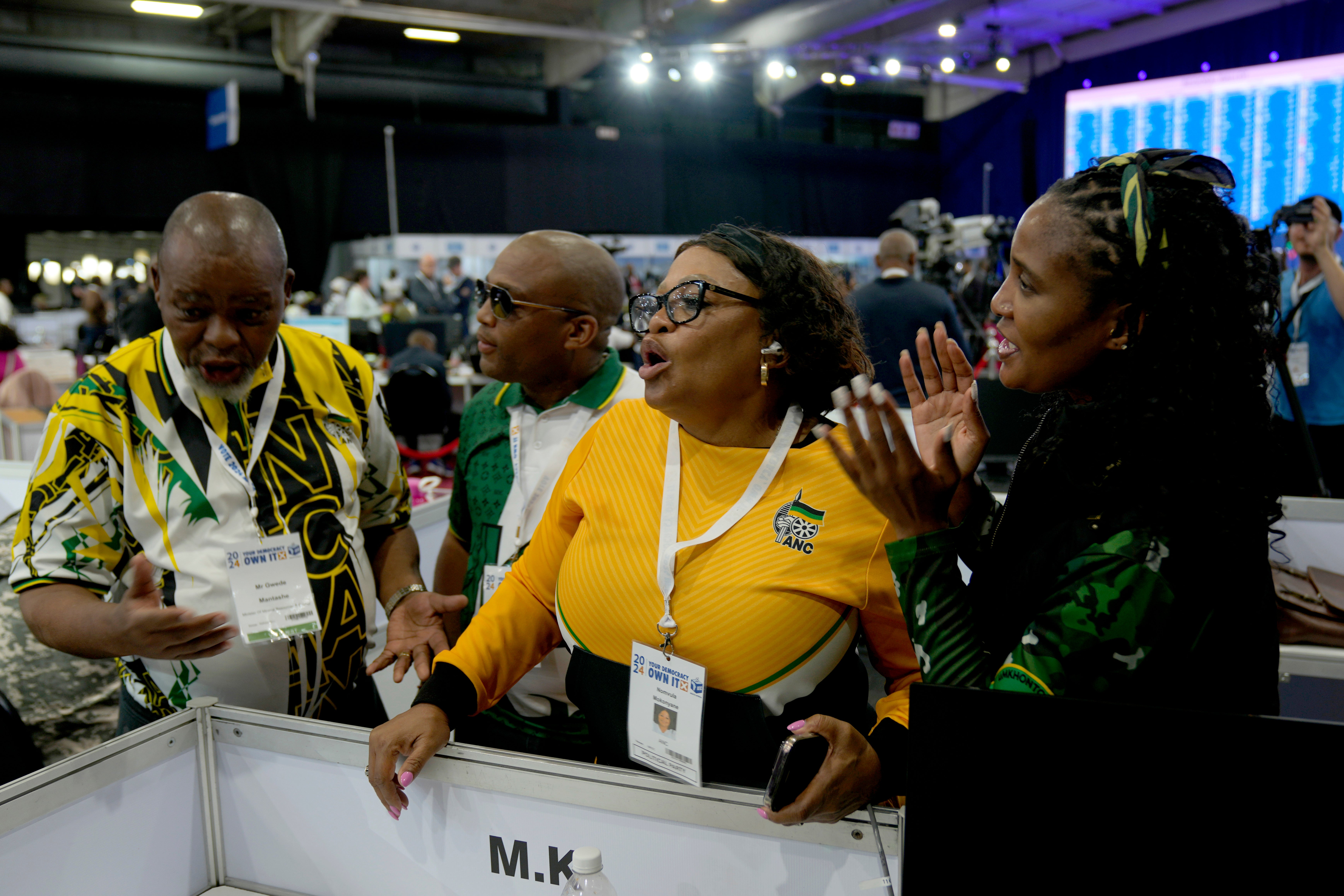ANC loses majority as its vote collapses in historic South Africa election
After 30 years in power, the African National Congress, must engage in tricky coalition talks with rivals

Your support helps us to tell the story
From reproductive rights to climate change to Big Tech, The Independent is on the ground when the story is developing. Whether it's investigating the financials of Elon Musk's pro-Trump PAC or producing our latest documentary, 'The A Word', which shines a light on the American women fighting for reproductive rights, we know how important it is to parse out the facts from the messaging.
At such a critical moment in US history, we need reporters on the ground. Your donation allows us to keep sending journalists to speak to both sides of the story.
The Independent is trusted by Americans across the entire political spectrum. And unlike many other quality news outlets, we choose not to lock Americans out of our reporting and analysis with paywalls. We believe quality journalism should be available to everyone, paid for by those who can afford it.
Your support makes all the difference.The African National Congress (ANC) party has lost its parliamentary majority in a historic election result that puts South Africa on a new political path for the first time since the end of apartheid.
A dramatically weakened mandate for the legacy party of Nelson Mandela, down from the 57.5 per cent it got in the previous 2019 parliamentary election, means the ANC must share power with a rival in order to keep it – an unprecedented prospect.
“We can talk to everybody and anybody,” Gwede Mantashe, the ANC chair and current mines and energy minister, told reporters in comments carried by the South African Broadcasting Corporation (SABC), dodging a question about who the party was discussing a possible coalition deal with.
Vote tallying from Wednesday’s poll was entering its final stages on Saturday, with results from 99.53 per cent of polling stations giving the ANC 40.21 per cent.
The main opposition party, the Democratic Alliance (DA), had 21.80 per cent, uMkhonto we Sizwe (MK), a new party led by former president Jacob Zuma, managed to grab 14.60 per cent, while the far-left Economic Freedom Fighters (EFF), led by former ANC youth leader Julius Malema, got 9.48 per cent.
“We have achieved our mission: ... to bring the ANC below 50 per cent. We want to humble the ANC,” Mr Malema told journalists at the results centre.
“We are going to negotiate with the ANC” for a possible coalition deal, he said, although that would not be quite enough to clinch a majority without including another party on the current count.
The ANC has won every previous national election by a landslide since the historic 1994 vote that ended white minority rule, but over the last decade its support has dwindled as the economy stagnated, unemployment rose and roads and power stations crumbled.
MK’s strong performance, especially in their leader Mr Zuma’s home province of KwaZulu-Natal, is one of the main reasons the ANC failed to secure a majority.
Analysts say one option for the ANC could be a “government of national unity” involving a broad spectrum of many parties, rather than a formal coalition between a few – an arrangement similar to the one set up after 1994’s historic all-race vote.
Mr Malema said the EFF was against that idea and preferred to be part of a coalition.
Political parties’ share of the vote determine their seats in the National Assembly, which elects the nation’s president.
Investors in Africa’s most industrialised economy will hope the uncertain picture can quickly become clear and that the country avoids an extended period of wrangling if the main political players struggle to agree how they can cooperate.
Some parties have questioned what they say are vote-counting inconsistencies that may lead to some results being contested.
Electoral Commission chair Mosotho Moepya told a news conference on Saturday that “every concern raised in these objections will be considered and we will do so carefully”.
Meanwhile, ANC first deputy secretary general Nomvula Mokonyane urged voters and communities to remain peaceful.
Despite the ANC’s result, president Cyril Ramaphosa could still keep his job, as the former liberation movement was on course to get about twice as many votes as the next party. But he will be weakened and could face calls to quit both from opposition parties and critics in the deeply divided ANC.
On Friday, however, Ms Mokonyane – one of the ANC’s top officials – backed him to stay on as party leader, and analysts say he has no obvious successor.
A deal to keep the ANC in the presidency could involve opposition backing in exchange either for cabinet posts or for more control of parliament, perhaps even the speaker.
“One of the positions we are going to demand from the ANC is ... the speaker of parliament,” Mr Malema said.
The election commission has pencilled in a final results announcement for Sunday.
Reuters
Join our commenting forum
Join thought-provoking conversations, follow other Independent readers and see their replies
Comments